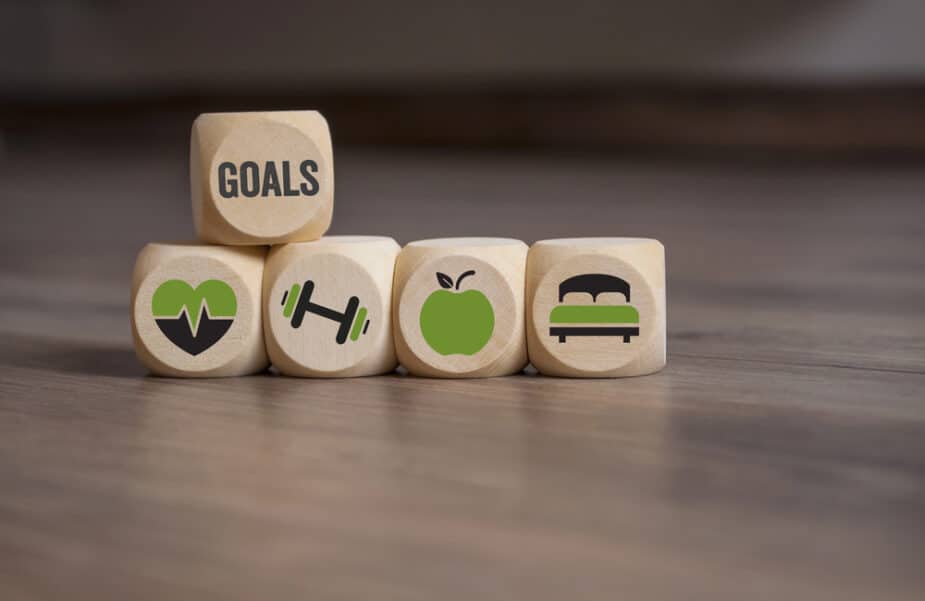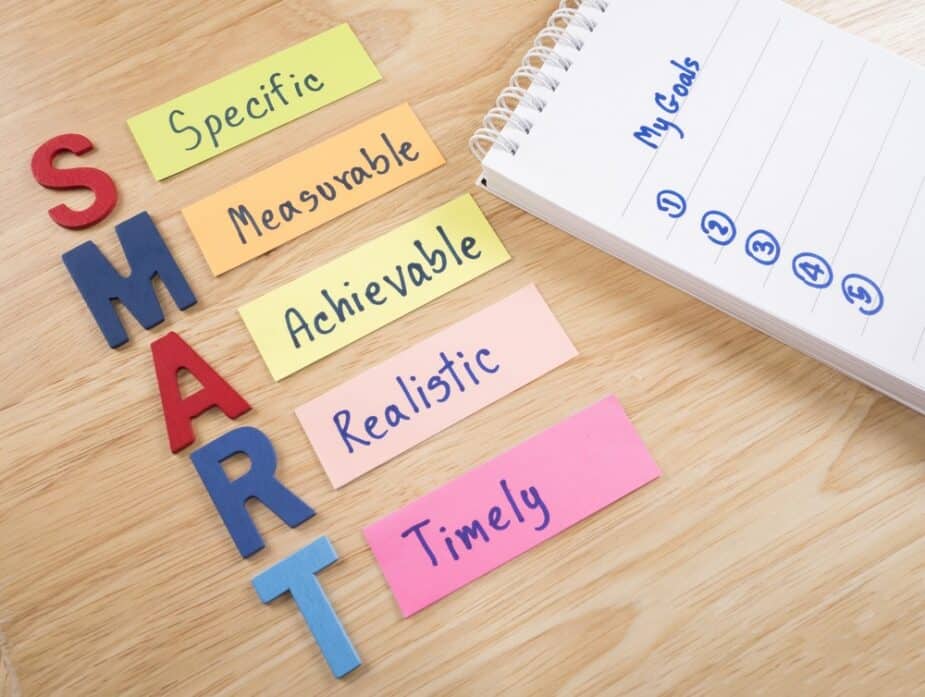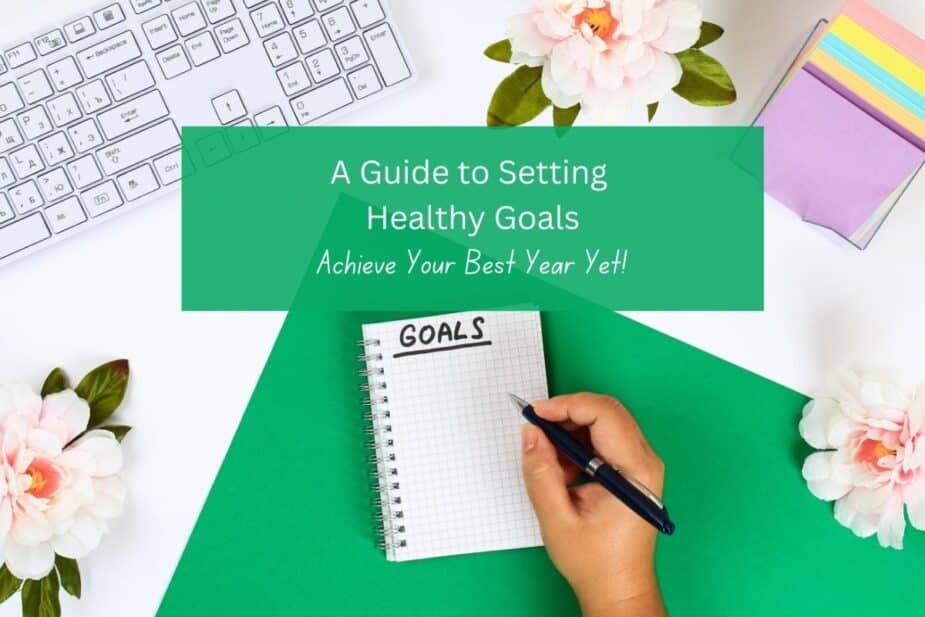The start of a new year—or any new season, really—is a perfect opportunity to pause and reflect. What went well over the last 12 months, and what do you want to work on over the upcoming year? Whether it’s eating better, moving more, or simply finding more joy in your daily routine, setting healthy goals can pave the way for a better, brighter future.
I know what you are thinking – I’m thinking it too – ugh…New Year’s resolutions never work, and, really, don’t we talk about this every year? How is this year going to be any different? Is there anything new about how to set goals to make them stick?
Believe me, I get it. Even as a Registered Dietitian, I’ve faced the frustration of setting a goal that feels exciting at first, only to see it quietly fade away. Somehow life gets in the way, and that exciting goal is quickly forgotten.
It’s a common struggle, and the good news is—you’re not alone, and with some planning and thought, you can set yourself up for success.
Achieving healthy goals isn’t about perfection; it’s about progress and finding what works for you. So yes, I hope to help you make this the year that your goal sticks.
How do you set goals that truly stick? In this post, we’ll explore how to create meaningful, sustainable habits that fit your life and help you feel your best all year long.
You’ll find a fun quiz to help you uncover the perfect goal to focus on.
Table of Contents
What Are Healthy Goals?

When I hear “New Year, New You” I honestly cringe. Just because we flip the calendar to a new year doesn’t mean we can or should completely try to overhaul our lives. The truth is, transformation doesn’t happen overnight.
Instead of aiming for a massive reset, why not focus on a couple of key areas that can make a meaningful difference?
Whether it’s the start of a new year, a new month, or even a new quarter, taking stock and setting realistic priorities can set you up for success. Small, thoughtful changes often add up to big improvements over time.
So, what healthy goals should you consider? It’s important to remember that health isn’t just about a number on the scale or your latest lab results. Let’s explore some areas that truly impact your well-being:
Nutritional Health
What you eat matters more than a number on the scale. Sure, weight plays a role in health, but the quality of your diet has a far greater impact.
Foods rich in vitamins, minerals, fiber, and antioxidants can reduce your risk of heart disease, diabetes, and certain cancers while supporting your bones, brain, eyes, and more.
I’ll never forget a woman who came to me for help with weight loss. After hearing about her diet, I was far more concerned about her nutritional status than her weight. Adjusting what she ate didn’t just help her lose pounds—it boosted her energy, mood, and overall strength. That’s the power of good nutrition!
Strength and Flexibility
Exercise isn’t about running marathons—unless, of course, you want it to be!
As we age, focusing on strength and flexibility becomes just as important, if not more so, than cardio.
Building muscle helps keep your bones strong, supports weight management, and improves balance. Flexibility helps with balance and prevents falls, making it easier to stay active and maintain independence as you age.
Work on these now, and trust me, you’ll thank yourself later!
Sleep
Struggling to get enough sleep? You’re not alone. According to the CDC, 25% of Americans don’t get the recommended 7 hours per night. Many people have trouble falling asleep, staying asleep, or both.
Poor sleep doesn’t just leave you feeling groggy—it can affect your ability to focus, increase your risk of accidents, and contribute to weight gain, heart disease, high blood pressure, and even Alzheimer’s disease. Prioritizing quality sleep is a fundamental component of good health.
Stress Reduction/Mindfulness

Chronic stress doesn’t just impact your mood—it takes a toll on your body, too. Stress can disrupt digestion, strain your heart, and affect your memory. It can lead to headaches, back and neck pain, and even suppress your immune system.
Incorporating stress-reducing practices like mindfulness or meditation can help improve your mental and physical health, making it easier to manage life’s challenges.
Tips to Set Healthy and Sustainable Goals
Setting a goal is the easy part. Sticking to that goal is what most people find challenging. So how can you make them something you will stick with so they become a habit?
When setting healthy goals, I think it helps to start with why you want to achieve this particular goal. Keep in mind, as we reviewed, many different things can impact our health. It’s not all lab numbers and a number on the scale.
Maybe a family member recently had bypass surgery, and it made you realize that you are at risk too. Is it now time to really tackle your cholesterol levels?
Or, you’ve signed up for an incredible biking vacation and you do not want to be the one who needs to use the rescue bus. So, you build a plan to increase your stamina so you can thoroughly enjoy your time on the bike.
When you have a strong and well-thought-out “why” it is a lot easier to have those goals stick.
It also helps to set your goals up as small steps. When you accomplish that first step, it’s an empowering feeling and can help you to keep going.
Another method for goal setting is called setting SMART goals.
What are SMART Goals?

The SMART goal system was originally developed for management to help develop measurable goals and objectives, but the concepts can apply to many things in life.
The acronym makes it easy to remember, and as you set goals think through each of these to make sure the goal fits.
Specific: Setting a vague goal such as getting in shape, losing weight or saving money is often as far as most people get, and one of the main reasons they aren’t successful. When the goal is more specific it’s easier to achieve.
Rather than:
- “Get in shape” ➡️ set a goal to take a 30-minute walk or go to the gym twice a week.
- “Eat healthy” ➡️try something more concrete like “eat one more vegetable every day.”
- “Get 8 hours of sleep every night” ➡️focus on changes that might impact the quality of your sleep, like putting your phone away an hour before you go to bed.
Measurable: Make the goal something you can easily track. How are you going to accomplish and measure your plan to eat one more vegetable every day?
Break it into measurable and achievable steps: Start with writing out a weekly meal plan so you know what vegetables to buy. Add them to your shopping list so you won’t forget what to buy. Some people find tracking what they eat helps as well. My weekly meal planner and tracker might be helpful for you.
Actionable: Write down a plan for exactly how you will reach your goal. Maybe you will write out a menu every week so you know what food you need to have on hand. Or, you will block a time on your calendar to walk every day or make your lunch at home instead of buying it out.
Determining the specific, actionable steps you need to take to reach your goal will help you be successful.
Realistic: Sure, it would be fantastic to save $30,000 in a year for a new kitchen or car, or to run a marathon in the spring, but is that realistic? Take some time to think through what you can realistically do and write out a plan to accomplish that. You can build on your success and add to it later.
Timeframe: Whatever your goal is, set a time frame for each step you need to accomplish. After a week or a month, check in with yourself and take a look at your progress. Then, adjust it if you need to so you can keep moving forward!
When you apply this system to setting healthy goals it gives you a framework for how to go about achieving them and a way to measure them.
Benefits of Setting Healthy Goals
We know what it feels like when those New Year’s resolutions fall by the wayside. You may forget about them and decide, oh well, they never last anyway. But when we set, and achieve our goals, we get more out of them than just the satisfaction of success. Here are a few ways setting and achieving goals can also impact our health.
Increased Motivation
When you start taking small steps toward making healthy changes you can often see improvements within a couple of weeks; taking the time to notice these changes along the way helps us to stay the course! For example, if your long-term goal is to be able to finish a 5k, celebrate each gain in endurance.
Storytime: I had a client once who really struggled to just walk to the end of her block and back. She could do it, but it was difficult for her. So, we started there instead of setting a goal that was too difficult and not realistic. Every day she set a goal to take that short walk…and she stuck with it! Within a couple of weeks, it was no longer a struggle for her to walk that short route and she felt so good and so motivated to keep at it, continuing to build her endurance and strength.
Provides Direction and Focus
Remember those AAA TripTiks? On long car trips, it was always fun to follow along and flip the page when you reached that last mile marker! Setting goals is kind of like planning a long road trip.
Your goals can be your TripTik for the next year. My Wellness Planner can help you plan and track your goals and progress each week to see how far you’ve gotten. Then, you can flip the page when you reach that milestone.
Improves Your Wellbeing
It stands to reason that when you focus on setting healthy goals and accomplishing them, you will feel better.
But well-being goes beyond just physical health. Some research has shown that setting and achieving healthy goals will provide you with a sense of accomplishment and can improve your self-esteem, too.
Helps You Focus on Self-Care
We often get so wrapped up in helping others and making sure they are taken care of that we neglect our own health needs. By setting a goal or two for ourselves, it permits us to focus on those things we need to do to take care of ourselves. And remember, if you aren’t healthy, you won’t be able to care for others.
What Type of Healthy Goal Should You Focus On?
Not sure where to start? Let’s find out! Take our quiz and get matched with a fun persona to guide your journey toward a healthier 2025.
Final Thoughts
Regularly reflecting on your health and identifying ways to improve is a powerful habit that doesn’t have to be reserved for January 1st, or as a result of your last trip to your doctor.
The process of setting healthy goals—ones that are thoughtful, measurable, and achievable—is the first step toward lasting change.
Keeping your “why” at the forefront of your mind, as a clear purpose can help keep you motivated when challenges arise. And don’t hesitate to share your goals with a trusted friend or family member who can encourage and hold you accountable.
Ready to get started? Take the goal-setting quiz to discover which area of your health to focus on.
Here’s to making 2025 your healthiest, happiest year yet!











